The Witcher 3: Wild Hunt
The Game That Fantasy Needed
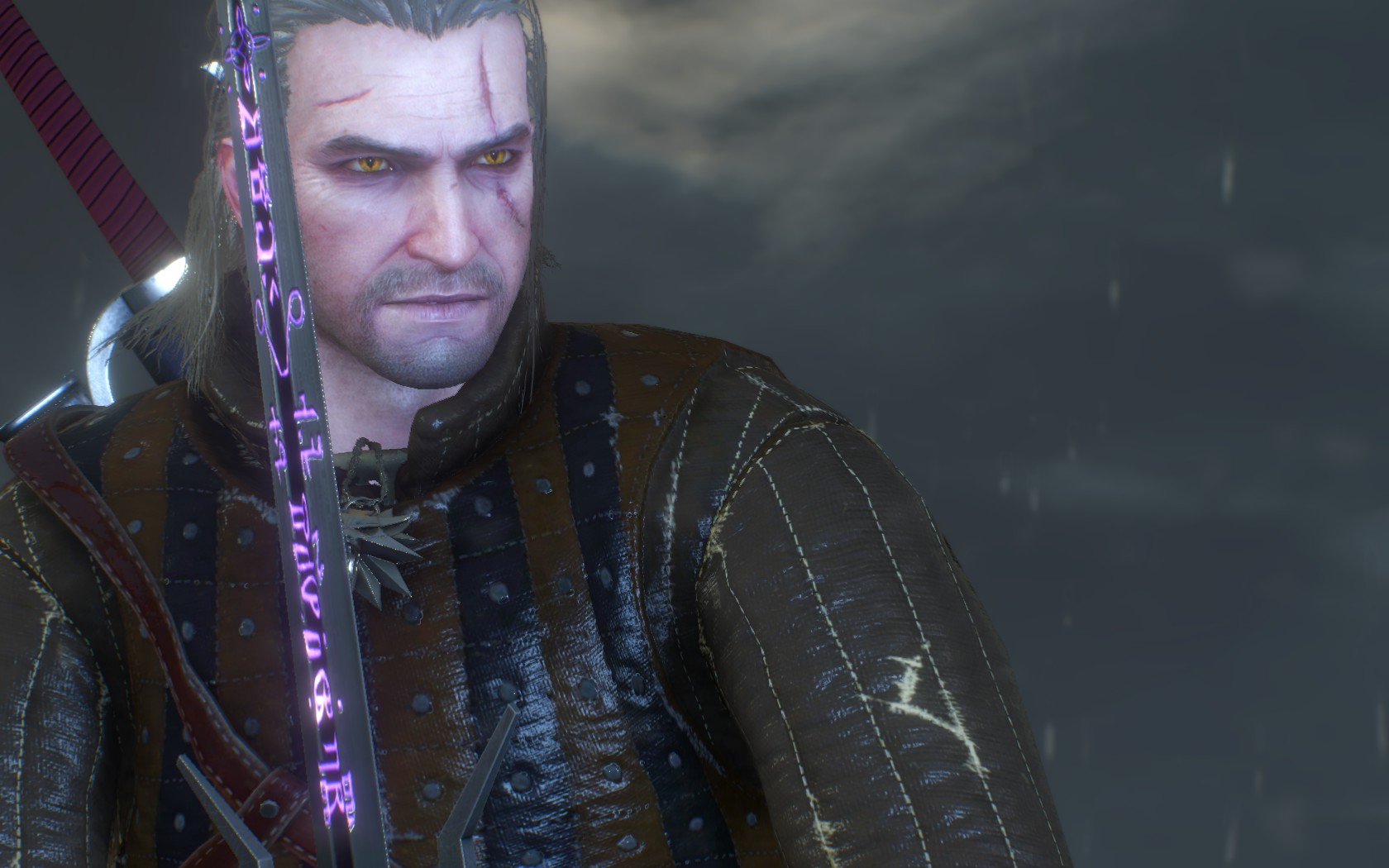
I think it's safe to say that no game set for release in 2015 had as much hype behind it as "The Witcher 3: Wild Hunt." I picked up this newest addition to the series not because I wanted it, but because it came with a graphics card that I purchased. I'm not deaf, so I had been paying all the speculation and the build-up to the game's release last week. I don't have any real memories of any of the other games in the series (I only played the "Witcher 2" for a couple of hours before putting it down) and I really don't have much of a connection to Geralt as the game's hero. It's with that neutral mindset that I entered the world of "The Witcher 3: Wild Hunt." Does it live up to all the hype?
After about thirty hours of play, the short answer is a solid yes.
Even as a relative newbie to the series, "The Witcher 3" does a fabulous job of thrusting you into the middle of things and introducing you to the world without necessarily hand holding you through the entire introduction. You quickly learn all the main supporting characters, Geralt's role in the world and you are set loose on the world.
Open-World
I want to start off by talking about the "Witcher 3's" open-world, because it is incredible. A lot of similar fantasy games claim to have an open-world, but they kind of corral you in areas until you're "strong enough" or far enough in the story to venture onward - and to an extent, the "Witcher 3" does this too, but the difference is that the areas that "Witcher 3" keeps you in are so huge and there is so much to do, that you rarely ever notice that you can't get to a particular island or mountain-top yet.

CD Projekt RED did not skip out on any of the aspects of the Witcher's world. The natural areas look astounding. The villages and cities breath. When you visit a village that has nothing to do with the main quest of the game, you can still walk around and feel the physical and emotional toll that a small town experience when it's in the middle of a war. You feel the depression and anxiety and the fear, and the attempts of the people to squeeze happiness whenever they can get it. If you hadn't gone exploring, you may have never stumbled upon it but it is there, living and breathing without you ever needing to show up to look at it.
The Story
This is one of those aspects that is difficult to go into without spoiling parts of the game, but I'm going to do the best I can. "The Witcher 3's" main story relies heavily on the player's knowledge of the previous game, because it pulls a lot from things that happened in those old games and there are a lot of recurring characters. This initial jump into the world was kind of disheartening for me, as I hadn't gone through the other games in the series, but the game's writers do a good job of easing newbies into it without slowing everything down for the players that do know everything that's going on. Even without that connection to the prior games, the writers were able to draw me in the world and what Geralt was trying to accomplish.
Not even half-way through the main quest, and I was already feeling like I knew the characters and I could figure how they would react to my action and dialogue choices.

Outside the main story arc, all the secondary quests are absolutely amazing - well....most of them. There are a few where in falls into the typical RPG trope of "Hey, can you clear this cave for me?" or "Hey, I lost this item somewhere in the woods. Can you help find it for me?" But by and large, the secondary quests feel like real stories that Geralt actually should partake in and not just filler. When you complete some of the more significant secondary quests, it feels like an accomplishment - oftentimes more so than certain parts of the main story arc.
The secondary quest that sticks out the most for me occurs relatively early in the game and centers around the Bloody Baron and his family. You originally meet the Baron as part of the main arc, but if you stick around and help him out, it leads to some of the most interesting characters, development and story that I've ever seen in a game. I was angered, I laughed, I cried, I was afraid, I was confused, I was victorious and above all, I was satisfied.
Combat
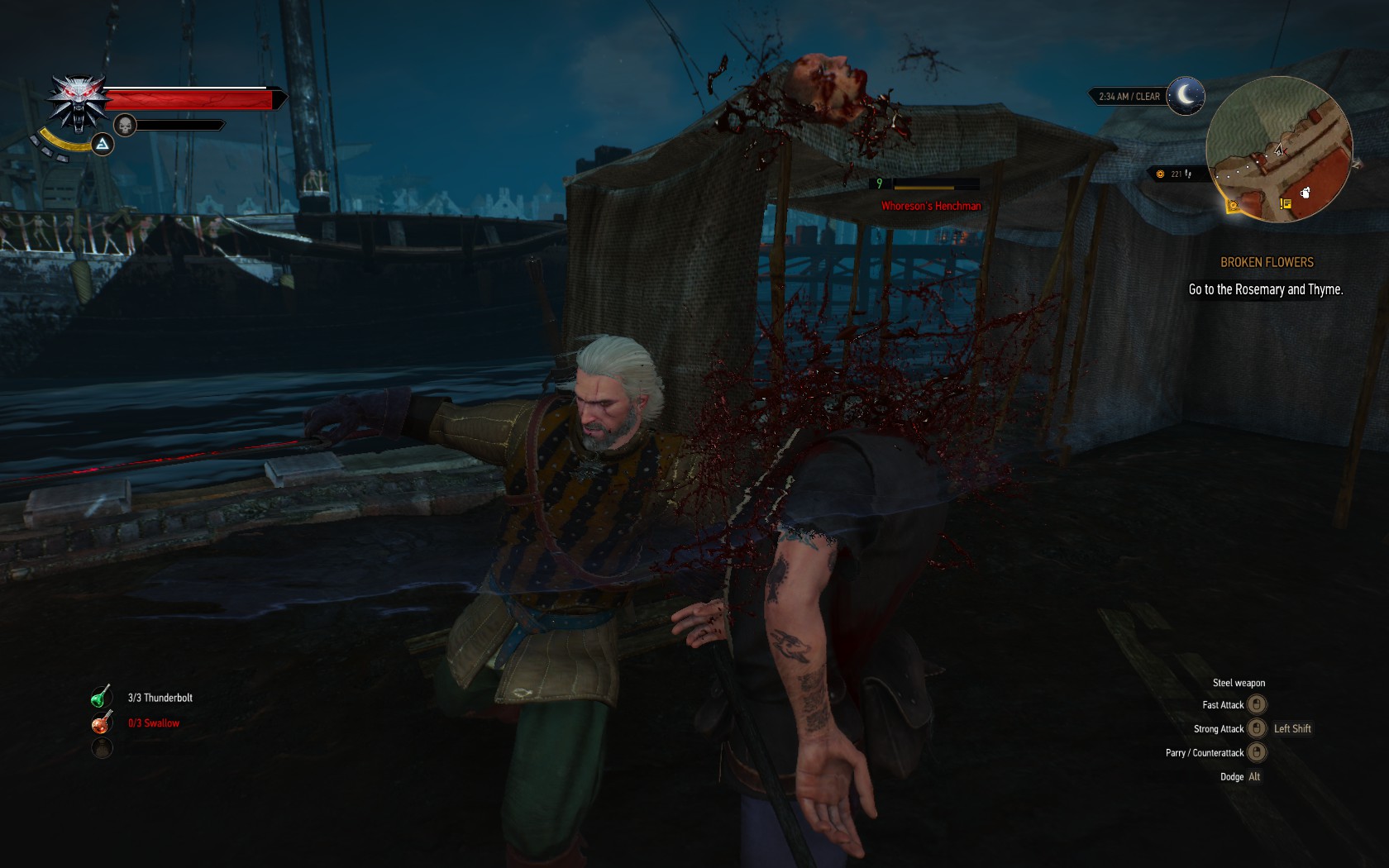
As a Witcher, Geralt's main responsibility in the game is killing monsters, and as one can imagine, that almost always involves some kind of combat. This is where "The Witcher 3" starts to get a little bit clunky. While Geralt moves really smoothly and has the looks of a super experienced swordsman, the controls always felt a bit clumsy - especially when he was facing more than one opponent. Even after 20 hours of gameplay, I was still having encounters where I initiate a combo and, for whatever reason, I'd not "aim" correctly and Geralt would start attacking a nearby bush. I was playing on a PC keyboard/mouse, so perhaps it was different with a controller, but fights with more than one combatant were always unnecessarily aggravating because I kept having issues keeping Geralt focused on a single individual....or, y'know, lay into an unsuspecting bush.
Geralt has two physical attacks, fast and strong but I rarely saw a need to do anything but fast attacks. Once you get that skill upgraded enough and learn how to combo it effectively, very little can stand up against Geralt's barrage of quick strikes. The strong attack were, obviously, stronger, but they were so slow and unwieldy that there never seemed an effective time to actually use them without suffering a blow or two from the enemy. So, as far as swordplay goes, it doesn't utilize the most exciting of mechanics.
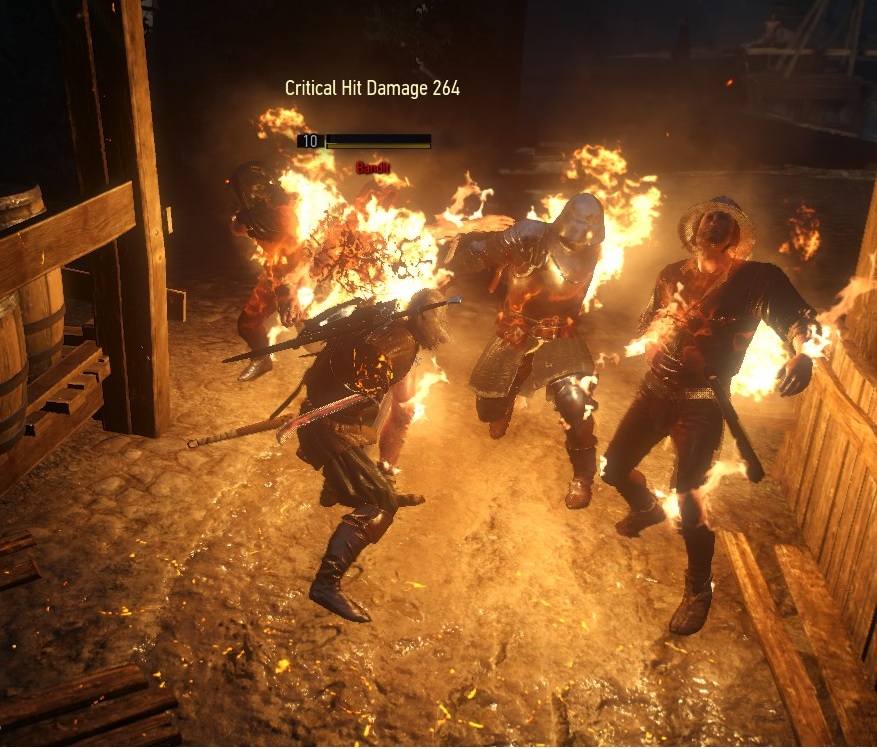
Adding Signs and potions into the mix adds a great bit of strategy to the game's fairly bland combat. Before a fight, if you know what you're up against, you can apply certain oils to your weapon to give you a bonus against that particular kind of enemy (undead, specters, beasts etc). You can also take one of dozens of potions to increase your damage, stamina, vitality or whatever to add to your advantage. And then there's the Signs, which are just Witcher magic. You can send out a wave of force or fire, you can daze an enemy (or influence them to fight for you), generate protective shields around yourself or, my personal favorite, set magical traps that slow down enemies that enter the circle. I can't count the number of times I laid out a trap, waited for an enemy to approach me and then danced around them with my fast attack while they slowly tried to respond. It is a very effective combo.
I will go ahead and say that, whenever possible, I was always mounted when doing any kind of combat (when I wasn't indoors or in a cave or whatever). Riding Roach into battle against bandits or small monsters made things so much easier. Seriously. If you're walking up to bandit camps and fighting them all at the same time while on foot, you are wasting your time because with Roach, you can just rush past them one at a time and cut them all to ribbons. It's almost foolproof. I say almost because Roach is a big baby sometimes, and when he gets scared, he'll toss you right into the middle of all your enemies. If you want a pro-tip, definitely invest in good blinders for Roach early in the game.
All your combat strategies are put to the test whenever you go out on a witcher contract to take down some terrible monster somewhere. If you just rush in and start swinging your sword like you were fighting a band of bandits, you're probably going to get punished for it. You have to prepare potions and oils. You have to read the lore the game gives you to learn about the monsters. You have to know the monster's weaknesses. Sure, you don't have to do all that work, and sure, maybe sometimes you get lucky, but the game provides you with all the tools you need to be the best witcher possible and it would be foolish not to use those tools. Monster fights are some of the funnest bits in the game - you really feel like you're up against a force of nature and not just some weird-looking animal. You learn the creature's movements, you learn to react and you attack when you can. Each monster is it's own puzzle and it is very rewarding to figure it out.
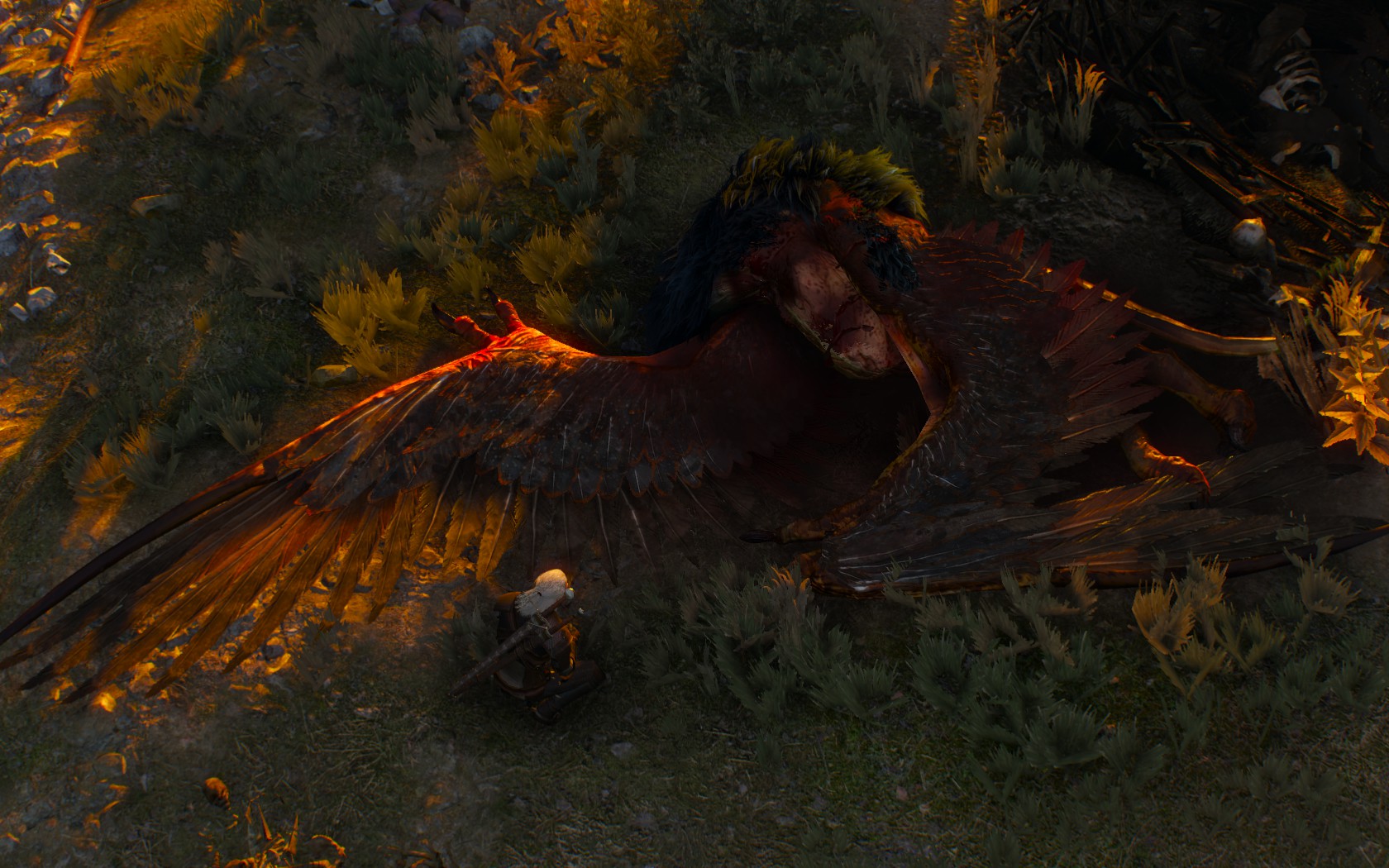
Crafting
As far as fantasy titles goes, "The Witcher 3" definitely has one of the most complex crafting systems that I've ever seen. Maybe complex isn't the right world. Convoluted? It's all overly complicated, but only because it's trying to be as realistic as possible. There are thousands of things to loot in the game, and just about all of those things can be dismantled at a blacksmith into their separate parts...and then those parts can be broken down again. And again. I'm pretty sure at some point that I dismantled ashes. That may be an exaggeration, but if I found some ashes in game and brought them to a smith to get broken down, I would not be surprised at all if they gave me different parts.
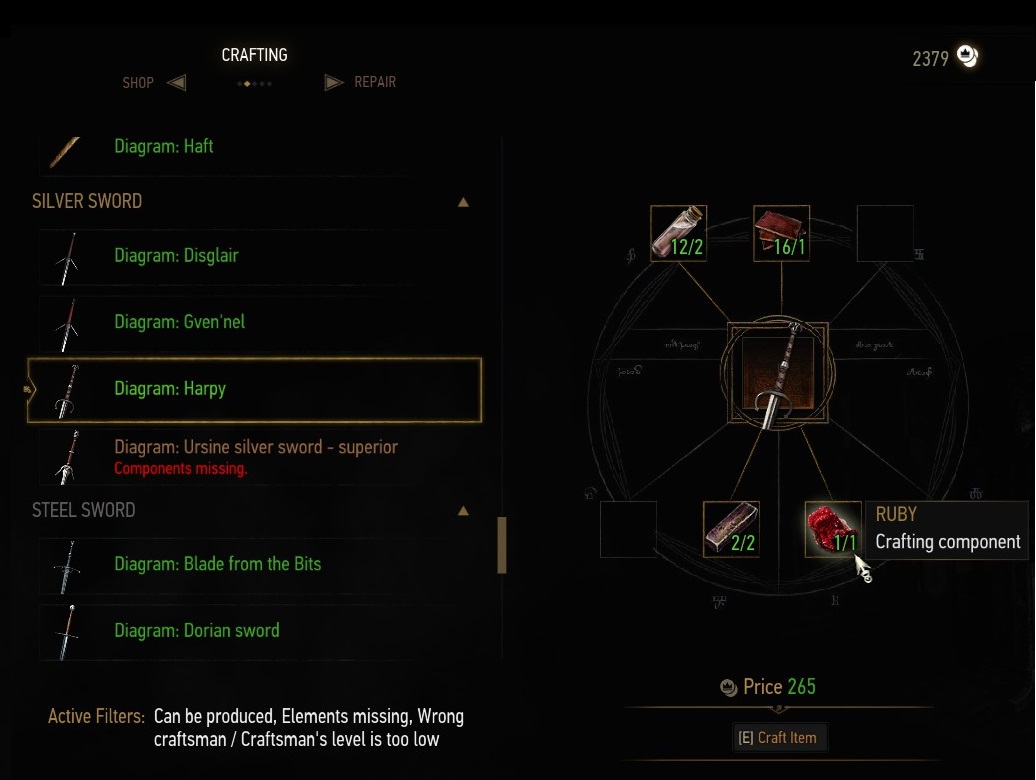
The way crafting works in "The Witcher 3" is that as Geralt travels around, he finds or buys "recipes" for various bits of armor or weapons. The next time he gets to a blacksmith or armorer, he has the option of having that smith craft him one of those recipes...provided Geralt has the parts. And no matter how many parts he finds or dismantles, he always seems to be missing one.
Besides metalworking, Geralt also has the ability to craft oils and potions that he can use to enhance himself in different situations. As with the smith crafting, Geralt has to find all the pieces (mostly plants and bits of monster) before he can complete a potion. The benefit of crafting potions and oils however, is that whenever you give the witcher a chance to rest, he'll automatically replenish the potions he's used, so that's one less thing to think about.
Graphics
"The Witcher 3: Wild Hunt" is easily one of the best-looking games I've seen in a while. It is one of those games where you'll walk to the top of a hill and then just stop to admire the scenery. Not many games have that power, but "The Witcher 3" is one of them and it uses that power very well. The environments seem so real sometimes you can actually smell them. That...isn't always as good thing, but it is nice.
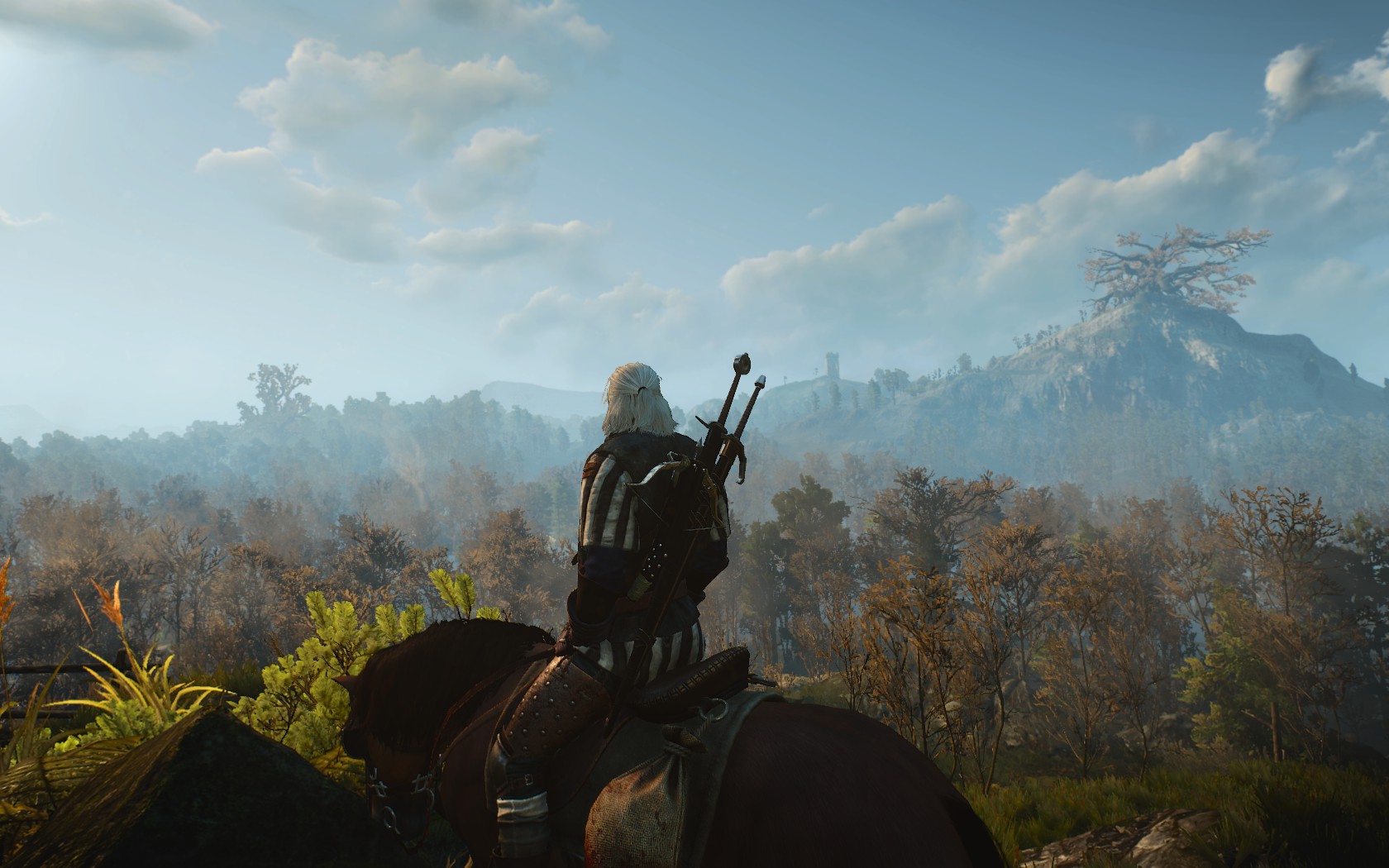
The Flaws
"The Witcher 3" is almost a perfect game, there are certain areas where I think the game stumbles and awkwardly grasps at modern social issues in an attempt to have some meaning in today's world...but when it does, it doesn't actually say anything. The most obvious attempt at this how the game deals with race and racism. Not to spoil anything, but a major arc of the game has to deal with the relations between the majority human population and the minority everything else - mostly elves, dwarves and magic-users. The game gets pretty brutal here.
But, the developers also kind of copped out in this aspect of the game. I didn't really notice until someone pointed it out to me, but everyone is white. Everyone. There is a succubus that you deal with at one point with giant horns that is black, but she is in the game for less than five minutes before she leaves. After that, at least as far as I am in the game, there are no people of color at all. And white elves and dwarves and witches are pretty poor stand-ins if you're trying to make a point about modern society.
I've seen arguments against this - mostly that the developers are Polish and the game is based on Polish, and that is an incredibly white part of the world. Also, the game takes place in the far north (the sun starts rising at 3:30am!) and that, typically, hasn't been the home of many people of color. And I get those arguments. But I counter with "The Witcher 3" is fantasy. The world of the Witcher series may be based on Poland/Europe, but it isn't Poland/Europe. There are dragons and griffons and ghouls stalking the world and that is fine, but there is absolutely no room for the occasional dark-skinned peasant or merchant? This is one of the few parts of "The Witcher 3" where I feel CD Projekt RED really dropped the ball.

Besides the general "whiteness" of the population, another issue I've found is the AI's complete lack of fear. I can not count the number of times I've been attacked by a group of low-level bandits and I've cut two of them completely in half and burnt a third to a crisp and the fourth is still coming at me with his trusty club. Yeah, I get that a group of bandits wouldn't know that Geralt is that much more powerful than they are, but after they watching their friends get hacked to pieces in a matter of seconds, you'd think the survivors would start thinking more about self-preservation and less about trying to hit him with their sticks. Watching an experienced witcher like Geralt utilize his expert swordsmanship and magical ability should definitely make at least some low-level non-monster AI to decide they're better off running.
Conclusion
It's really hard to put a topper on his review, because even after probably close to 30 hours of playing it, I am still playing it. I have a relatively short attention span when it comes to most open-world games, but "The Witcher 3" has called me back time and time again.
Why?
Because the world is rich and vibrant. Because I actually care about the characters that I interact with. Because the story feels important and it demands attention. CD Projekt RED has created a game that is an easy contender for GOTY 2015. Even when "The Witcher 3" is at it's worst, it is multitudes better than the next would-be competitor. "The Witcher 3: Wild Hunt" is modern-day fantasy gaming at it's strongest and not something to be ignored.
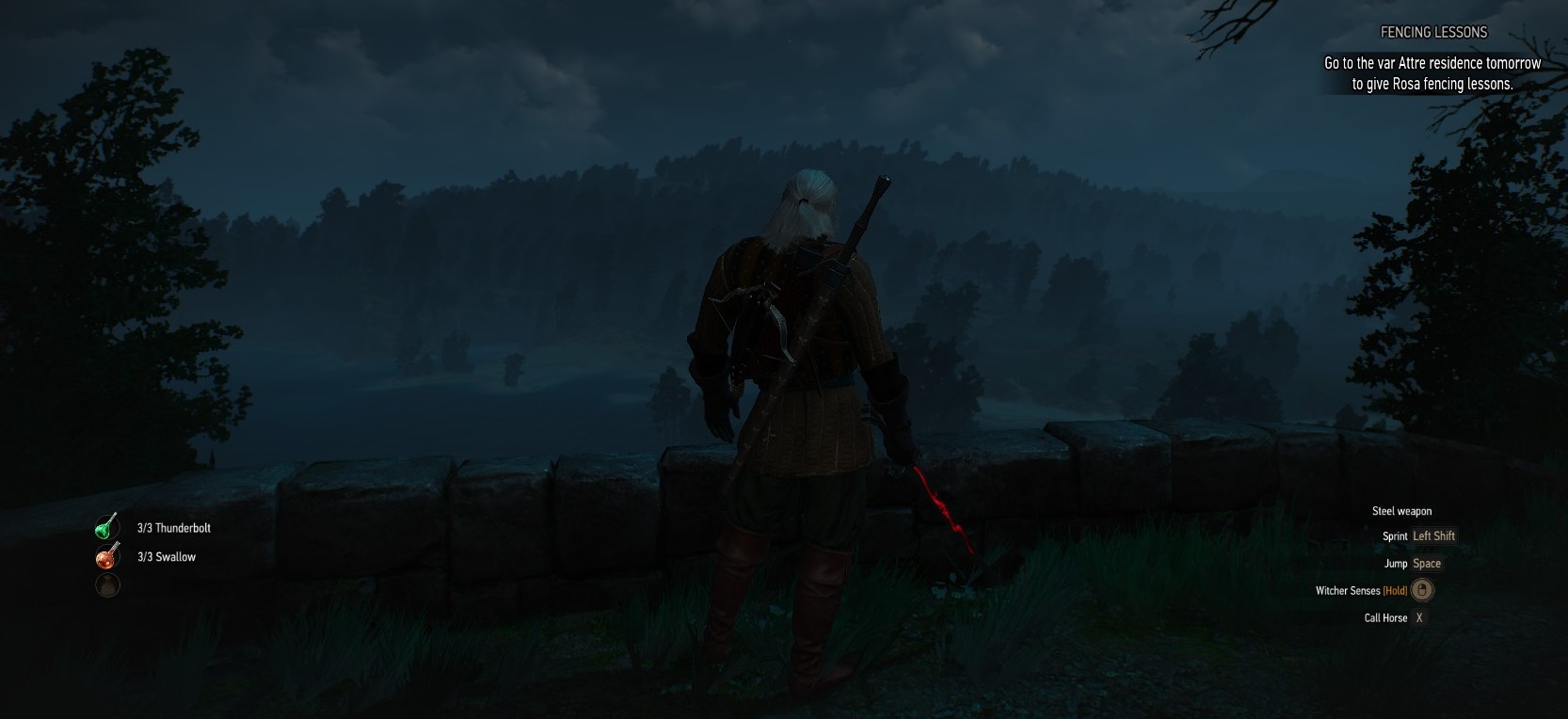
Pros
- Excellent story
- Gorgeous environments
- Brilliantly-designed open world gameplay
- Developing combat strategy for different foes is pretty satisfying
- Fantastic crafting system
Cons
- Fighting sometimes feels like a hack-n-slash fest
- Crafting system feels overly complex at times
- Some NPCs seem like clones of other NPCs
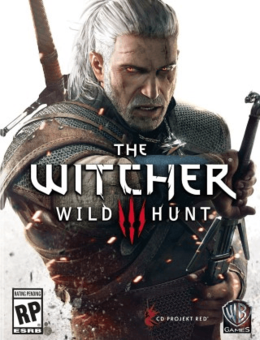
The Witcher 3: Wild Hunt 10 / 10 Read our Review »
Release: 5/18/2015 [NA]
ESRB Rating: Rating Pending
Publisher: WB Games
Platforms: PC, PS4, Xbox One
Genres: Action Role-playing
Purchase: Amazon